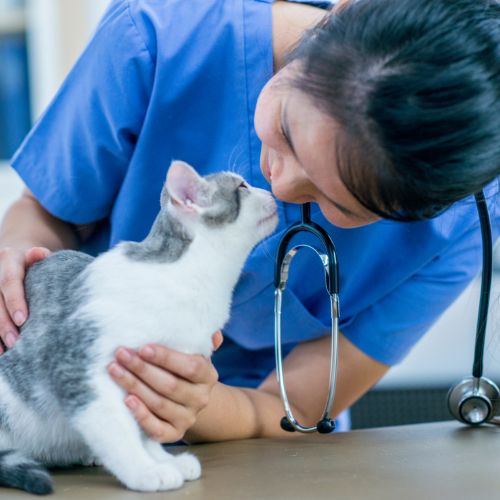Pet Wellness
in Brooklyn & Upper East Side, NY
Pet Wellness Exams
Our veterinarians believe that prevention is the key to your pet’s long-term health, as well as minimizing the lifetime cost of care. The wellness exam is similar to the yearly physical you receive from your doctor. We highly recommend yearly wellness exams, vaccinations, regular lab work, deworming, and fecal checks, as well as preventive medications against heartworm, fleas, and ticks.
We customize service and care recommendations across all life stages, and wellness exams are a chance for us to assess your pet’s overall health, discuss any changes we see, and inform you of advancements in veterinary care. Additionally, the wellness exam provides you with one-on-one time to discuss any concerns you may have regarding your pet’s health.
The wellness exam consists of a nose-to-tail evaluation of your pet. During the exam we:
- Inspect your pet’s oral cavity, teeth, throat, and dental hygiene.
- Examine your pet’s eyes and check their vision.
- Scan their ears for infection, ear mites, allergic reactions, and other related health issues.
- Evaluate your pet’s respiratory and cardiac function.
- Test your pet’s reflexes.
- Palpate lymph nodes and abdomen.
- Inspect the skin.
- Palpate joints and muscles for arthritis and other orthopedic conditions.
- Suggest appropriate laboratory diagnostics to evaluate the function of internal organs, blood, and other systems.
New Puppy and Kitten Exams
Bringing home a new puppy or kitten is exciting for any family. New pets add energy and fun to your home and are a source of unceasing affection as they bond with you.
Puppies and kittens also require a little extra attention to ensure they get a healthy start in life. Comprehensive physical exams during these early developmental stages are important. If a pet is new to your home, a little time and veterinarian-tested advice on housebreaking and training are most likely needed.
Your first visits with any one of our veterinarians are perhaps the most important. These initial visits are when the client, doctor, and animal first meet and begin to form a relationship that lasts for your pet’s lifetime. We like to take our time with these visits to give your puppy or kitten a thorough pet wellness exam, talk with you about concerns you may have, offer health care and training advice, and more.
Your kitten's first visit includes:*
- Diet discussion, including types of food that are best for a cat’s unique requirements.
- Litter and litter box discussion
- Behavior discussion
- Spaying and neutering discussion
- Vaccine protocol
- Discussion of pet health insurance
- Microchipping for cats going outdoors.
- Fecal exam for worms and other intestinal parasites
- Testing for Feline Leukemia Virus (FeLV) and Feline Immunodeficiency Virus (FIV)
- A complete physical exam which includes detection of potential congenital problems.
*some additional fees may apply
Your puppy's first visit includes:*
- Diet discussion, including types of food to feed, guidelines on feeding intervals, and quantities
- Housetraining discussion
- Behavior discussion
- Spaying and neutering advice
- Formulation of a minimal, individualized vaccine protocol.
- Discussion on pet health insurance.
- Microchipping. Should I get this done? When is the best time to do this?
- Fecal exam for worms and other intestinal parasites
- A complete physical exam which includes detection of potential congenital problems and anything else you may want to discuss.
*some additional fees may apply
This is your new pet and we’re happy to answer any questions.
Senior Pet Care
By taking the time to learn more about the special needs of your senior-aged pet, you have taken the first step toward ensuring your pet continues to lead a healthy and happy life.
Pets in their senior years—roughly age seven and older—begin to go through a gradual reduction of their physical capabilities. This process can be slowed and managed through proper veterinary care, thereby offering your beloved pet an extended period of vitality and good health.
Your pet can develop glaucoma, too. This is a condition in which the fluid pressure inside the eye increases to a point where the optic nerve is damaged, causing loss of vision and blindness. Glaucoma is relatively common in animals and can develop as your pet ages – this is known as chronic glaucoma – or as the result of an injury or illness – which is known as acute glaucoma.
Additionally, preventive care tailored to your pet’s age, lifestyle, risk factors, and other elements can help prevent common diseases or detect them at early and easily treatable stages.
As your pet’s primary caregiver, you play an essential role in their prolonged good health. While you cannot control age-related decline, you can influence your pet’s activity level, living conditions, access to quality senior veterinary care, and daily nutrition. With your veterinarian’s help, you can manage these factors in order to increase your pet’s vitality and well-being, even as his or her pace slows a bit.
Once the specific needs of your older dog or cat are addressed, a solid baseline for you and us can be used to monitor your pet at a time when small changes can be detected and before they become serious and even life-threatening concerns.
Regular Blood Testing
A complete physical exam includes a heartworm test, parasite screening, and a full blood workup. Not only can a full chemistry panel and complete blood count identify the presence of underlying disease processes, but these tests help create a baseline should your pet become ill between routine examinations.
Additionally, blood work is necessary if your veterinarian recommends a dental cleaning, removal of skin masses, or any other procedure that requires anesthesia.
We also recommend comprehensive blood work annually for all pets over the age of seven.
Fleas and Ticks
Fleas and ticks are everywhere! Though they are a bigger problem in certain parts of the country, no cat or dog is completely safe from them. Fortunately, many safe and highly effective products are available for monthly protection from these pests.
Fleas are ubiquitous because they are reproductive marvels; a single female flea can lay as many as 30 eggs a day and can live and breed on your pet for up to 100 days. The eggs then fall and land in carpets and upholstery, where they can lie dormant for up to 8 months. To maintain flea control in your home, you must:
- Regularly vacuum carpets, furniture, floors, and areas where your pet sits and sleeps.
- Wash your pet’s bedding, toys, and towels weekly.
Beyond causing serious discomfort and infesting your home, fleas, and ticks carry diseases dangerous to both you and your pet. Fleas can transmit tapeworms and cause intense allergic reactions and skin infections. Ticks can also carry a variety of serious illnesses to both animals and humans; these include Lyme disease and Rocky Mountain Spotted Fever.
The good news is that these problems can be avoided by using parasite-prevention products that are available at our hospital. When used properly and according to our directions, these products are very safe and effective.
Heartworm Disease
Heartworm disease is a serious, life-threatening disease in dogs and cats that is spread through mosquito bites. After an infected female mosquito bites your pet, the heartworm migrates through the bloodstream and moves to the heart and adjacent blood vessels, maturing to adults within 6-7 months in dogs and 8 months in cats. As many as 30 species of mosquitoes can transmit heartworms.
Until the early 1970s, the occurrence of heartworm disease in the United States was primarily confined to the southeastern part of the country. Today, heartworm disease is found almost everywhere and is particularly abundant in the northeast.
Clinical symptoms of heartworm disease develop very slowly. Often symptoms are not noticeable until several years after the initial infection. In dogs, these symptoms include lack of energy, exercise intolerance, coughing, and difficulty breathing. As the disease progresses, most of these dogs will develop congestive heart failure if not treated. In cats, the symptoms of heartworm disease are similar to those of feline asthma. Some cats may exhibit no signs of the disease, while others may suddenly die.
Heartworm prevention is simple. For dogs, a once-monthly heartworm preventative can be given as a tasty chewable treat or a topical liquid applied between the shoulder blades. For cats, we only recommend the use of the topical liquid once a month. These prophylactics not only prevent against heartworm, but they also kill and prevent many other types of worms that can infect your dog and cat, such as fleas and ear mites.
If you would like to have your pets tested for heartworm disease or if you would like additional information on how best to protect your pet and your family from these dangerous parasites, please call us today for an appointment.
Veterinary Dispensary
As the prescribing veterinarian for your pet’s medications, we are able to ensure there is a direct link between the exam room and our pharmacy. We provide the right medication, at the right dose, in the correct form, as quickly as possible, and we are able to easily instruct you on the medication’s use as well as monitor its effectiveness.
We maintain a complete inventory of pharmaceuticals, vitamins, shampoos, flea and tick control products, and heartworm preventatives to meet the needs of your pet. We also carry a full line of prescription diets.
Ensuring that you have convenient and timely access to competitively priced medications is an important aspect of our veterinary practice.
Refills are easy too! Simply give us a call, and we can help!


